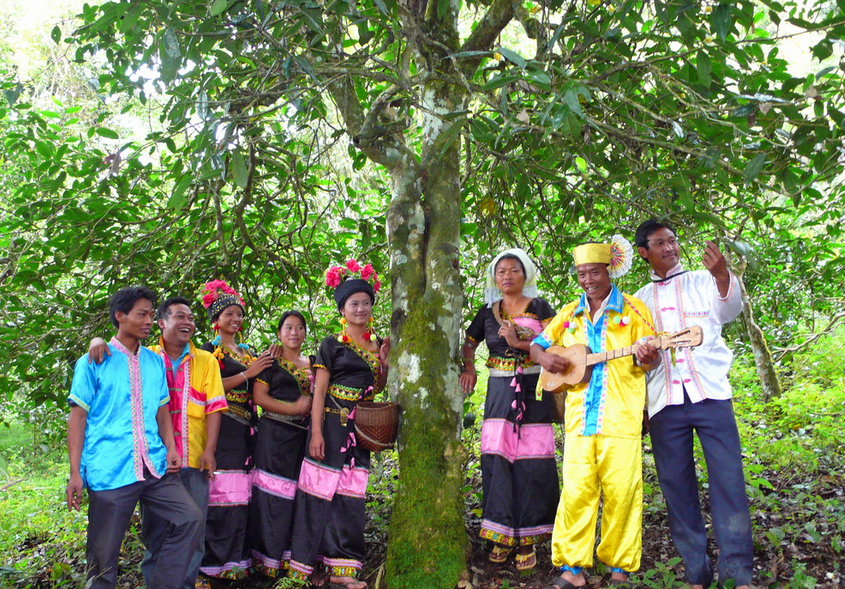

 The Blang people, numbering 82,400, live mainly in Mt. Blang, Bada, Xiding, Mengman, and Daluo areas of Menghai County, Xiaomengyang and Damenglong of Jinghong County, and Mengpeng Town and Mango Village in the Xishuangbanna Dai Autonomous Prefecture in Yunnan Province. There are also scattered Blang communities in the neighboring areas like Simao, Lincang and Baoshan.
The Blang people, numbering 82,400, live mainly in Mt. Blang, Bada, Xiding, Mengman, and Daluo areas of Menghai County, Xiaomengyang and Damenglong of Jinghong County, and Mengpeng Town and Mango Village in the Xishuangbanna Dai Autonomous Prefecture in Yunnan Province. There are also scattered Blang communities in the neighboring areas like Simao, Lincang and Baoshan.
The Blang people have a lot of names, which are called by themselves or by people of other nationalities. The names they call themselves vary from one area to another. Those living in Xishuangbanna call themselves "Blang;" and those in Simao use "Benzu" as their self-name. There are also other names like "Lawa," "Wu," "Wuren," and "Awa." in the past, the Han people call them "Puman;" the Bai call them "Buen;" the Lahu call them "Kapu;' and the Dai call them "La." After the founding of the PRC, they are called by a joint name "Blang" according to their own will.
The Blangs speak their own language, which belongs to the Menggaomian Blang branch of the South Asian language family. Their language has two dialects: the Blang dialect and the Awa dialect. The language does not have a written form, but Blangs often know the Dai, Va and Han languages. And some also know how to write in the Han or Dai language, in which their historical and classical works are often written. Agriculture was the economic mainstay of Blang society, with dry rice and paddy rice as the dominant crop, followed by corn, sesame, melons and fruits, beans, and potatoes. They also grow economical crops, including tea, cotton, palms and hemp. They are also among the earliest and best growers of the world-famous Pu'er tea. They live mainly on dry rice, added with corn, buckwheat, soybean, pea, and red millet. They prefer sour food, and like chewing betel nuts. Chewing homemade "sour tea" is also widely favored by the Blangs, and they also serve their guests with it or give it as a present to people.
Agriculture was the economic mainstay of Blang society, with dry rice and paddy rice as the dominant crop, followed by corn, sesame, melons and fruits, beans, and potatoes. They also grow economical crops, including tea, cotton, palms and hemp. They are also among the earliest and best growers of the world-famous Pu'er tea. They live mainly on dry rice, added with corn, buckwheat, soybean, pea, and red millet. They prefer sour food, and like chewing betel nuts. Chewing homemade "sour tea" is also widely favored by the Blangs, and they also serve their guests with it or give it as a present to people.
The Blang people in different regions wear almost the same style of clothes. Men wear collarless jackets with buttons down front, loose black trousers and head wrappings of black or white cloth. In the past, they had a custom of tattooing their skin. Women wear tight short black shirts, and black narrow skirts. Blang women regard teeth dyed black as beautiful. The Blangs live in wood-and-brick cottages or two-storied bamboo houses with railing.
The Blangs believe in some primitive religion and Hinayana (a branch of Buddhism).
You will only receive emails that you permitted upon submission and your email address will never be shared with any third parties without your express permission.
